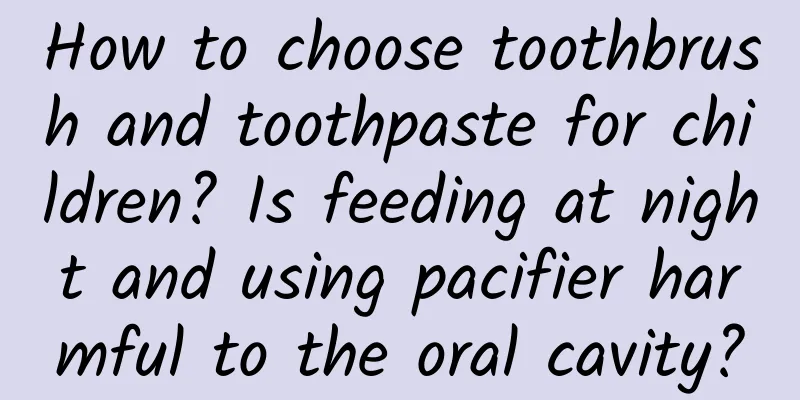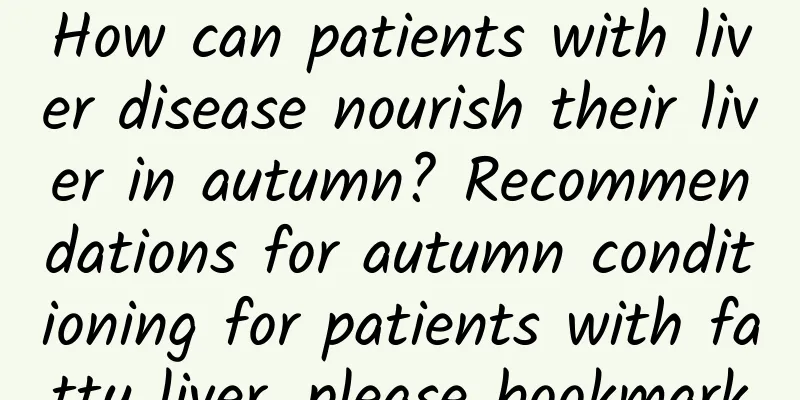How to choose toothbrush and toothpaste for children? Is feeding at night and using pacifier harmful to the oral cavity?

|
Author: Rong Wensheng, Chief Physician, Peking University School of Stomatology Vice Chairman of the Oral Prevention Committee of the Chinese Stomatological Association Reviewer: Qin Man, Chief Physician, Peking University School of Stomatology Chairman-elect of the Pediatric Dentistry Committee of the Chinese Stomatological Association Oral health is very important for children's growth and development. Many parents believe that baby teeth have to be replaced someday, so if they are damaged, there is no need to treat them, and they can just wait for the permanent teeth to erupt. Figure 1 Original copyright image, no permission to reprint This is a very wrong idea. Deciduous teeth usually start to erupt when a child is around 6 months old, and the period of tooth replacement is from 6 to 12 years old. Before the age of 6, the child relies on deciduous teeth to chew food. If the deciduous teeth are damaged, the child will not be able to chew food, which affects the intake of nutrition and will lead to malnutrition. Once the deciduous teeth are decayed, the disease will progress very quickly and they will rot away soon. Bacteria will then enter the tooth roots. If not treated in time, the disease will further develop into the alveolar bone. The permanent tooth germs in the alveolar bone are growing and developing. Bacteria will infect the permanent tooth germs, causing the permanent teeth to grow abnormally, with abnormal shapes or poor mineralization. Chewing stimulation can promote the development of maxillofacial region. If oral hygiene is poor, one does not like to eat, or one is afraid to bite because of the pain from tooth decay, then the jawbone development will not be perfect, and there will be no place for permanent teeth to grow in the future. The teeth will be unevenly arranged or grow in other places. In addition, children aged 6-12 are in the tooth replacement period, and deciduous teeth and permanent teeth coexist in the same oral environment. Decayed deciduous teeth contain a large number of pathogenic bacteria, which increases the risk of decay in permanent teeth and endangers the health of permanent teeth. Therefore, caries of deciduous teeth must be treated as soon as possible. So, why are children prone to tooth decay? 1. What are the three most common causes of tooth decay in children? First, the usage rate of fluoride toothpaste is too low. The standardized use of fluoride toothpaste is very safe, and its effect in preventing tooth decay is very clear. Long-term use of fluoride toothpaste can reduce tooth decay by 23%-24%. Second, parents’ awareness of maintaining their children’s oral health is too weak. Before children go to primary school, the survey found that less than 10% of parents insist on brushing their children's teeth every day. Children of this age do not have flexible hand muscles yet, and cannot brush their teeth cleanly by themselves. They cannot squeeze toothpaste by themselves because they will squeeze too much. Therefore, before children go to primary school, it is recommended that parents help their children brush their teeth clean, which most parents cannot do. Third, bad eating habits. Parents do not provide good guidance on diet. They eat whatever they want, eat all kinds of snacks, and eat and drink all day long. The snacks that children like to eat are sticky and sweet. After eating, they stick to their teeth. They don’t rinse their mouths with water because there are food residues, bacteria are easy to multiply, and produce acid, which corrodes teeth. The above reasons have caused the high incidence of dental caries among children in our country, which is on the rise. It is relatively rare for a child to have dental caries on one tooth. Most of the time, multiple teeth are decayed at the same time, because the oral cavity is an overall environment. Therefore, parents should pay more attention to their children's oral health and let their children use fluoride toothpaste in a standardized manner. For children under six years old, parents should help their children brush their teeth every day. Let children eat a healthy diet, eat less sweets, and rinse their mouths in time after eating, which can effectively prevent tooth decay. 2. How to choose toothbrushes and toothpaste for children? Children should use a toothbrush that is suitable for their age, because toothbrushes are also divided into different age groups. The first toothbrush in life may be used to brush two small baby teeth, and the toothbrush head is also the same size as two small baby teeth. When the child is about one year old, four upper teeth and four lower teeth have erupted, and then you can change to a slightly larger infant toothbrush. As you age, your dentition gradually improves and the head of the toothbrush will become larger and larger. Once your permanent dentition is built around the age of 12, you can use a toothbrush that is about the same size as an adult's. Figure 2 Original copyright image, no permission to reprint When choosing a toothbrush for your child, in addition to paying attention to the size, you should also choose a flat-headed toothbrush head with soft bristles. The only recommended toothpaste is fluoride toothpaste, which is safe if used in a standardized manner. Parents should help their children squeeze the toothpaste, control the amount of toothpaste used, and brush their teeth twice a day, morning and evening. Figure 3 Original copyright image, no permission to reprint In fact, after the child is born, before the teeth erupt, you should start paying attention to oral hygiene and oral care. 3. How to clean the baby’s mouth simply and effectively when he has not grown teeth? Theoretically, whether the baby is breastfed or formula-fed, some milk curds will remain on the baby's gums after feeding, so it is recommended to clean the baby's mouth every day even if the baby has not grown teeth. How to clean your child's mouth? The simple way is for the mother to wash her hands, take a clean gauze and dip it in boiled water or warm water, and gently swirl it in the child's mouth to wipe out the milk curds left after drinking milk. Clean it once a day. Children are accustomed to having someone move around in their mouths from an early age. After their teeth erupt, they are more receptive to brushing, and there is an adaptation process from an early age. 4. Will night feeding affect children’s oral health? Usually, the primary incisors begin to erupt when the child is around 4-6 months old. Some studies have found that excessive breastfeeding, more than ten times at night, and too many night feedings may increase the risk of tooth decay. Because breast milk contains lactose, the lactose will also be metabolized by the bacteria in the mouth to produce acid, which will corrode the teeth. So after the child is six months old, I hope to reduce the number of night feedings. 5. Will using a pacifier cause children’s dental deformities? Pacifiers are still very useful during the weaning period, as they provide psychological comfort. Figure 4 Original copyright image, no permission to reprint However, pacifiers should not be used for too long. Children over three years old should not use them. Using them again will cause many problems, such as tooth deformities and jaw dysplasia that lead to front teeth not biting, which is the most common. Starting around two years old, you should gradually stop letting your child rely on pacifiers. |
>>: How do you choke when your throat is blocked by something foreign?
Recommend
Today, you need to know these data about "autistic children"!
In 2020, the APEC Institute of Health Sciences of...
Is sticky and stringy menstruation a sign of uterine cold?
Every woman will experience regular uterine bleed...
Causes of acne on female buttocks
Getting acne is actually a relatively normal thin...
What is the reason for yellow leaves and small flowers of Vinca rosea? How to remedy the yellow leaves and small flowers of Vinca rosea?
Vinca rosea is loved by people because of its gor...
Baking soda for vaginal douches
Maybe some of our female friends have to do some ...
Can I drink safflower during menstruation?
Can you drink safflower during menstruation? When...
I got pregnant 1 day after my period.
How many days after menstruation is it easy to ge...
The reason why the early pregnancy test paper is light in color
Nowadays, the simplest way people use to determin...
Is it ok to drink coffee before your period?
Drinking coffee before menstruation generally doe...
Will menopause cause palpitations?
Menopause is something that no woman wants to fac...
What does cervical conization mean?
Cervical conization is a surgical treatment in ob...
How did the guitar come about? How to choose a good guitar
A good guitar has clear sound quality, good sound...
How to feed with inverted areola
Inverted areola will make many mothers very anxio...
How long after giving birth is it good to wear a belly band?
Many women start to shape their bodies after givi...
What should I do if I catch a cold during confinement?
Many women have shared their experiences of confi...









